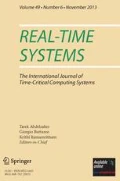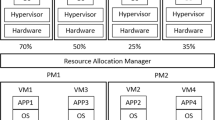Abstract
As virtualization becomes increasingly popular, more critical applications that require real-time performance guarantees are deployed on virtualized systems. In such systems, the Hierarchical Real-Time Scheduling (HiRTS) framework divides the scheduling problem into task-level scheduling and resource-level scheduling. Specifically, resource-level scheduling divides a physical resource into multiple resource partitions while task-level scheduling schedules the tasks on each resource partition. Accordingly, the Regularity-based Resource Partitioning (RRP) model offers efficient resource-level scheduling. Despite the availability of adequate resource-level tools, the task-level scheduling based on the RRP model still has a scope for improvements. To extend the applicability of the RRP model under a variety of task workload environments, this paper offers: (1) a more practical schedulability test for independent tasks whose key parameters, i.e., Worst-Case Execution Time (WCET), period, and deadline, are non-integral multiples of a time slice; (2) a tuned Earliest Deadline First (EDF) scheduling approach and a corresponding schedulability test for intra-virtual-machine (intra-VM) dependent tasks; (3) schedulability tests for self-suspended tasks based on Fixed-Relative-Deadline (FRD) scheduling strategies.








Similar content being viewed by others
Notes
A formal definition of resource partition is given in Sect. 2.
In the previous version of this paper, Eq. 1 was given as \(\sum \nolimits _{i=1}^{\Vert T\Vert }{\frac{c_i}{\min (d_i, p_i) - R(A)}} \le \alpha (A)\), which was incorrect.
In our previous version, Eq. 2 was given as \(\sum \nolimits _{i=1}^{\Vert T\Vert }{\dfrac{\left\lceil c_i \right\rceil }{\left\lfloor \min (d_i, p_i)\right\rfloor - R(A)} } \le \alpha (A)\), which was incorrect.
References
Baruah S, Bonifaci V, Marchetti-Spaccamela A, Stougie L, Wiese A (2012) A generalized parallel task model for recurrent real-time processes. In: 2012 IEEE 33rd real-time systems symposium, pp 63–72. https://doi.org/10.1109/RTSS.2012.59
Chen J-J (2016) Computational complexity and speedup factors analyses for self-suspending tasks. In: 2016 IEEE real-time systems symposium (RTSS), pp 327–338. https://doi.org/10.1109/RTSS.2016.039
Chen J-J, Liu C (2014) Fixed-relative-deadline scheduling of hard real-time tasks with self-suspensions. In: 2014 IEEE real-time systems symposium, pp 149–160. https://doi.org/10.1109/RTSS.2014.31
Chen J-J, Nelissen G, Huang W-H (2016) A unifying response time analysis framework for dynamic self-suspending tasks. In: 2016 28th Euromicro conference on real-time systems (ECRTS), pp 61–71. https://doi.org/10.1109/ECRTS.2016.31
Chen J-J, von der Brüggen G, Huang W-H, Liu C (2017) State of the art for scheduling and analyzing self-suspending sporadic real-time tasks. In: 2017 IEEE 23rd international conference on embedded and real-time computing systems and applications (RTCSA), pp 1–10 https://doi.org/10.1109/RTCSA.2017.8046321
Chen J-J, von der Brüggen G, Shi J, Ueter N (2018) Dependency graph approach for multiprocessor real-time synchronization. In: 2018 IEEE real-time systems symposium (RTSS), pp 434–446. https://doi.org/10.1109/RTSS.2018.00057
Chen W-J, Huang P-C, Leng Q, Mok AK, Han S (2017) Regular composite resource partition in open systems. In: 2017 IEEE real-time systems symposium (RTSS), pp 34–44. https://doi.org/10.1109/RTSS.2017.00011
Chen W-J, Wu P, Huang P-C, Mok AK, Han S (2019) Online reconfiguration of regularity-based resource partitions in cyber-physical systems. In: 2019 IEEE real-time systems symposium (RTSS), pp 495–507 . https://doi.org/10.1007/s11241-021-09364-5
Chen J-J, Nelissen G, Huang W-H, Yang M, Brandenburg B, Bletsas K, Liu C, Richard P, Ridouard F, Audsley N (2019) Many suspensions, many problems: a review of self-suspending tasks in real-time systems. Real-Time Syst 55(1):144–207. https://doi.org/10.1007/s11241-018-9316-9
Cheng AMK, Dai G, Paluri PK, Ansari M, Knape D, Li Y (2019) Fault-tolerant regularity-based real-time virtual resources. In: 2019 IEEE 25th international conference on embedded and real-time computing systems and applications (RTCSA), pp 1–12. https://doi.org/10.1109/RTCSA.2019.8864575
Crespo A, Ripoll I, Masmano M, Arberet P, Metge J (2009) Xtratum an open source hypervisor for tsp embedded systems in aerospace. Data Systems In Aerospace DASIA, Istanbul
Easwaran A, Anand M, Lee I (2007) Compositional analysis framework using EDP resource models. In: Proceedings of the 28th IEEE international real-time systems symposium, USA, pp 129–138. https://doi.org/10.1109/RTSS.2007.17
Elapsed real time. https://en.wikipedia.org/wiki/Elapsed_real_time. accessed 03 Apr 2021
Galizzi J, Arberet P, Damery J-C, Guy C, Crespo A, Masmano M, Roubert F (2015) Lvcugen-ready for flight? ESASP 732:20
Goldenberg M, Lu P, Schaeffer J (2003) Trellisdag: a system for structured dag scheduling. In: Workshop on job scheduling strategies for parallel processing, pp 21–43. https://doi.org/10.1007/10968987_2.Springer
Guo Z, Bhuiyan A, Saifullah A, Guan N, Xiong H (2017) Energy-efficient multi-core scheduling for real-time dag tasks. In: 29th Euromicro conference on real-time systems (ECRTS). Schloss Dagstuhl-Leibniz-Zentrum fuer Informatik. https://doi.org/10.4230/LIPIcs.ECRTS.2017.22
Huang W-H, Chen J-J (2016) Self-suspension real-time tasks under fixed-relative-deadline fixed-priority scheduling. In: 2016 Design, automation test in europe conference exhibition (DATE), pp 1078–1083
Huang T-W, Lin D-L, Lin Y, Lin C-X (2021) Taskflow: a general-purpose parallel and heterogeneous task programming system. IEEE Trans Comput Aided Des Integr Circ Syst. https://doi.org/10.1109/TCAD.2021.3082507
Kim J, Andersson B, Niz Dd, Rajkumar RR (2013) Segment-fixed priority scheduling for self-suspending real-time tasks. In: 2013 IEEE 34th real-time systems symposium, pp 246–257. https://doi.org/10.1109/RTSS.2013.32
Li Y, Cheng AMK (2012) Static approximation algorithms for regularity-based resource partitioning. In: 2012 IEEE 33rd real-time systems symposium, pp 137–148. https://doi.org/10.1109/RTSS.2012.66
Li Y, Cheng AMK (2016) Transparent real-time task scheduling on temporal resource partitions. IEEE Trans Comput IEEE 65(5):1646–1655. https://doi.org/10.1109/TC.2015.2449857
Li Y, Cheng AMK (2017) Toward a practical regularity-based model: the impact of evenly distributed temporal resource partitions. ACM Trans Embed Comput Syst. https://doi.org/10.1145/3092945
Liu W, Chen J-J, Toma A, Kuo T-W, Deng Q (2014) Computation offloading by using timing unreliable components in real-time systems. In: Proceedings of the 51st annual design automation conference. DAC ’14, pp. 1–6. Association for Computing Machinery, New York, NY, USA. https://doi.org/10.1145/2593069.2593109
Ma N, Xia Y, Prasanna VK (2011) Exploring weak dependencies in dag scheduling. In: 2011 IEEE international symposium on parallel and distributed processing workshops and Phd forum, pp 591–598. https://doi.org/10.1109/IPDPS.2011.204
Mok AK-L (1983) Fundamental design problems of distributed systems for the hard-real-time environment. PhD thesis, Massachusetts Institute of Technology
Mok AK, Alex X (2001) Towards compositionality in real-time resource partitioning based on regularity bounds. In: Proceedings 22nd IEEE Real-Time Systems Symposium (RTSS 2001) (Cat. No.01PR1420), pp 129–138 . https://doi.org/10.1109/REAL.2001.990604
Paluri PK, Dai G, Cheng AMK (2021) Arinc 653-inspired regularity-based resource partitioning on xen. In: The 22nd ACM SIGPLAN/SIGBED conference on languages, compilers, and tools for embedded systems. https://doi.org/10.1145/3461648.3463854
Saifullah A, Li J, Agrawal K, Lu C, Gill C (2013) Multi-core real-time scheduling for generalized parallel task models. Real-Time Syst 49(4):404–435. https://doi.org/10.1007/s11241-012-9166-9
Shin I, Lee I (2003) Periodic resource model for compositional real-time guarantees. In: RTSS 2003. 24th IEEE real-time systems symposium, 2003, pp 2–13 . https://doi.org/10.1109/REAL.2003.1253249
Stavrinides GL, Karatza HD (2012) Scheduling real-time dags in heterogeneous clusters by combining imprecise computations and bin packing techniques for the exploitation of schedule holes. Fut Gener Comput Syst 28(7):977–988. https://doi.org/10.1016/j.future.2012.03.002
Stavrinides GL, Karatza HD (2015) A cost-effective and qos-aware approach to scheduling real-time workflow applications in paas and saas clouds. In: 3rd international conference on future internet of things and cloud, pp 231–239. https://doi.org/10.1109/FiCloud.2015.93
Van der Leest SH (2010) Arinc 653 hypervisor. In: 29th digital avionics systems conference, pp 5–215220. https://doi.org/10.1109/DASC.2010.5655298
von der Brüggen G, Huang W-H, Chen J-J (2017) Hybrid self-suspension models in real-time embedded systems. In: 2017 IEEE 23rd international conference on embedded and real-time computing systems and applications (RTCSA), pp 1–9. https://doi.org/10.1109/RTCSA.2017.8046328
Xu M, Phan LTX, Lee I, Sokolsky O, Xi S, Lu C, Gill C (2013) Cache-aware compositional analysis of real-time multicore virtualization platforms. In: 2013 IEEE 34th real-time systems symposium, pp 1–10 . https://doi.org/10.1109/RTSS.2013.9
Author information
Authors and Affiliations
Corresponding author
Additional information
Publisher's Note
Springer Nature remains neutral with regard to jurisdictional claims in published maps and institutional affiliations.
Rights and permissions
Springer Nature or its licensor (e.g. a society or other partner) holds exclusive rights to this article under a publishing agreement with the author(s) or other rightsholder(s); author self-archiving of the accepted manuscript version of this article is solely governed by the terms of such publishing agreement and applicable law.
About this article
Cite this article
Dai, G., Paluri, P.K. & Cheng, A.M.K. Enhanced schedulability tests for real-time regularity-based virtualized systems with dependent and self-suspension tasks. Real-Time Syst 58, 401–429 (2022). https://doi.org/10.1007/s11241-022-09391-w
Accepted:
Published:
Issue Date:
DOI: https://doi.org/10.1007/s11241-022-09391-w




